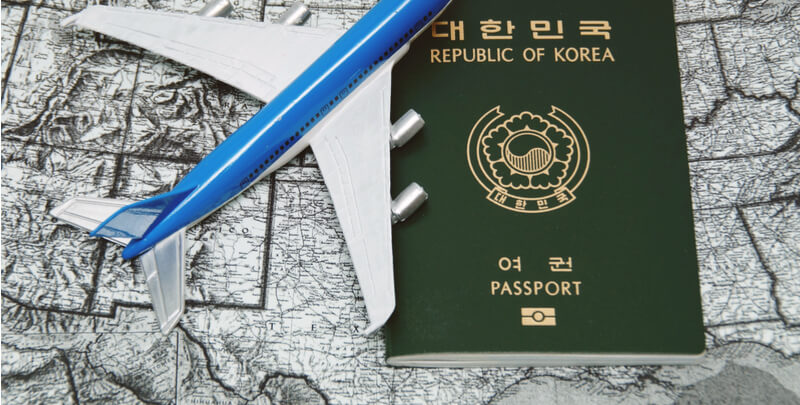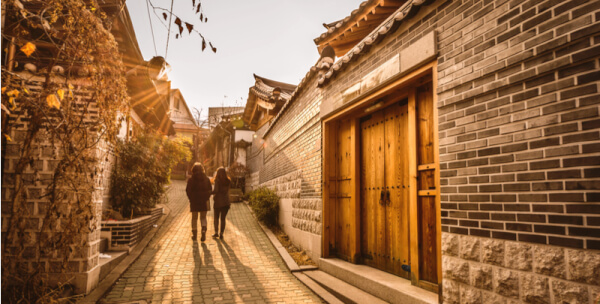Renting in South Korea: Everything you need to know
Thinking about moving to South Korea? Find out what you need to know about renting in South Korea in this guide.

South Korea has had an industrial boom in the last decade, which has stabilized the country, grown its economy, and made it more attractive to foreigners.
What was once a country with very few migrants has become a hotspot for foreigners, because of their opportunity for jobs and newer immigration laws.
Whether you’re hoping to form a business, find a new job or just start a new way of life, this guide will walk you through the most important steps towards obtaining South Korean Citizenship.
If you’re unsure how you’ll handle your finances as a South Korean citizen, Wise can help you manage your money, and will give you the real exchange rate when you exchange South Korean Won.

There’s no way to sugar coat it; obtaining a South Korean citizenship is pretty difficult. As such, it’s considered easier to stay in the country on a permanent resident visa (known as an Alien Registration Certificate) instead, although that does carry its own restrictions.
For instance, once you obtain a long-term visa in South Korea, whenever you make a change in your lifestyle, you’ll need to update your Registration Certificate with District Immigration within 14 days of the change. This includes a new job, or a change of apartment. Our guide on renting in the popular expat town of Seoul may help you with this.
In order to become a citizen of South Korea, most foreigners go through the naturalization process. There are three main ways you can become a naturalized citizen of South Korea: through residency, family (including a spouse) and business ownership.
If you’ve lived in South Korea for more than five years consecutively, you can consider applying for general naturalization. This type of citizenship only applies if you’ve never obtained Korean nationality in the past, and if you have no Korean family relations. To apply, you’ll need to meet all of the following criteria:
The second type of naturalized citizenship is simple naturalization, which is predominantly available to foreigners who are of South Korean descent of some sort. To be eligible, it’s crucial that you meet at least one of the following criteria:
In order to qualify for simple naturalization you must also meet the requirements of general naturalization, as listed above, however, you need only to have lived in South Korea for three consecutive years rather than five.
If you’re looking into South Korean citizenship for business reasons, and you can invest 100 million KRW (approximately 79,000 USD) into your own small business in South Korea, you may be eligible for a D-8 Investment Visa.¹ But please note that the South Korean government requires proof that the business is viable when you renew the visa.
As briefly mentioned above, you can seek citizenship through simple naturalization if you're married to a South Korean citizen. However, you must have maintained your marriage status for the past two or more years, and you’ll need to meet all the other criteria listed before you’re granted citizenship.
The application process for South Korean citizenship is extensive. Your completed application must include the following:
To prove your financial stability you may include a certificate from your bank showing you have a balance of more than 30,000,000 KRW, a certificate of employment or a document from the Attorney General proving you’re a dependent. You must also include two letters of reference from someone with a professional title. This can be a member of a government, a professor, a lawyer, an executive or manager, the chief of a department or similar. You must also pay a fee of 100,000 KRW (approximately 80 USD) for your application to be processed.
If you’re funding the citizenship process from your account back home, use Wise to get the real exchange rate and cut out expensive international bank transfer fees.
Unfortunately, there is no clear-cut answer to this. It will depend entirely on the type of naturalization you're seeking, and therefore the documentation that's required from you. As with most application processes, even within the US, if the Immigration Office requires additional information to support your application, the process will take longer.
Once you’ve submitted all the necessary documents to the South Korean immigration office, you’ll need to take the written examination. This will be a 20-question multiple choice exam that will test your knowledge of South Korean history, politics, culture and customs.
Following the multiple choice exam, you’ll need to attend an interview in order to test your proficiency in the language, as well as your attitude towards Korea and liberal democracy. To pass this section, you must be at about level four on the Test of Proficiency in Korean (TOPIK).² This test is notoriously difficult – you even have to sing the first four verses of South Korea’s national anthem, without reading the lyrics off of a page.
Following your interview, it typically takes one to two months for the immigration office to issue a decision on whether to give you permanent residency.³
In most cases, South Korea requires that you renounce your foreign citizenship in order to obtain South Korean citizenship. However, there are some exceptions to the rule. It’s possible to maintain dual citizenship if you:
If you're granted your citizenship, you'll have to pledge not to exercise your foreign citizenship in South Korea.⁴
Once you’ve been granted South Korean citizenship, you can apply for a South Korean passport by following these steps:
Step 1. Make an appointment at your closest South Korean embassy or consulate – South Korean passports use biometric data so you’ll need to make your application in person.⁵
Step 2. Attend your appointment and take the relevant documentation with you. This will include two passport photos and proof of US residency, but the requirements depend on individual circumstances.
Step 3. Pay the fee – the standard fee for a Korean passport is $53 and typically needs to be paid in cash.
Step 4. Your passport should be issued to you within 3-4 weeks.⁶
All sources checked on 3 May 2022
*Please see terms of use and product availability for your region or visit Wise fees and pricing for the most up to date pricing and fee information.
This publication is provided for general information purposes and does not constitute legal, tax or other professional advice from Wise Payments Limited or its subsidiaries and its affiliates, and it is not intended as a substitute for obtaining advice from a financial advisor or any other professional.
We make no representations, warranties or guarantees, whether expressed or implied, that the content in the publication is accurate, complete or up to date.

Thinking about moving to South Korea? Find out what you need to know about renting in South Korea in this guide.

As a senior, you must decide where you’re going to retire. South Korea is an exciting and modern option that many Western retirees consider. Whether you’re a...

Seoul has a large expat community drawn from all around the world, thanks to the large numbers of global businesses based there. IBM, Google and Toyota, for...

One important decision, if you’re moving to South Korea with family, is how to ensure that your children receive the best possible education. Luckily, South...